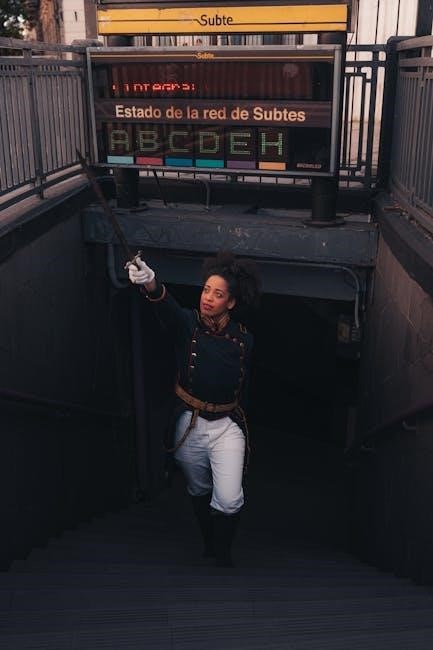Master Harold…and the Boys⁚ A Deeper Dive into the Play
Master Harold…and the Boys is a powerful play by Athol Fugard that explores the complex relationship between a young white boy and two older black men in 1950s South Africa‚ during the era of apartheid. This play delves into themes of race‚ identity‚ power dynamics‚ and the enduring impact of the past. The play’s setting‚ characters‚ and dialogue create a poignant and thought-provoking experience that continues to resonate with audiences today.
The Setting and Context
Master Harold…and the Boys is set in a tea room in Port Elizabeth‚ South Africa‚ in the 1950s‚ a time when the country was under the oppressive rule of apartheid. The play’s setting is crucial to understanding the characters’ lives and the themes it explores. The tea room is a microcosm of the larger society‚ reflecting the racial segregation and power imbalances that defined apartheid. The tea room is a place where both black and white people come together‚ but their interactions are dictated by the rigid social hierarchy of apartheid.
The play’s setting also underscores the historical context of South Africa. The 1950s saw the implementation of increasingly harsh apartheid laws‚ which enforced racial segregation and discrimination. This period was marked by political unrest and social upheaval‚ as black South Africans fought for their rights and dignity. The play’s setting allows Fugard to explore the impact of apartheid on the lives of individuals‚ particularly on the relationship between Hally and his two black servants‚ Sam and Willie.
The play’s setting also highlights the complexities of life in a society grappling with profound social and political change. The tea room serves as a backdrop for the characters’ personal struggles‚ their attempts to navigate a system that seeks to define them by their race‚ and their yearning for a more just and equitable future. The play’s setting is not merely a backdrop but a crucial element that shapes the characters’ actions‚ dialogue‚ and the play’s overall message.
The Characters⁚ Hally‚ Sam‚ and Willie
Master Harold…and the Boys centers around three distinct characters⁚ Hally‚ a white teenager‚ and Sam and Willie‚ two middle-aged black men. The dynamic between these characters forms the heart of the play‚ reflecting the complexities of race and power relations in apartheid South Africa.
Hally‚ the central character‚ is a troubled and complex young man grappling with his identity and the social realities of apartheid. He is caught between the world of his white privilege and the influence of his black servants‚ Sam and Willie. Hally’s behavior is often characterized by anger‚ frustration‚ and a sense of alienation from both his white and black peers.
Sam‚ Hally’s closest confidant‚ embodies wisdom‚ compassion‚ and a deep understanding of the injustices of apartheid. He serves as a father figure to Hally‚ offering him guidance and support‚ but also challenging his prejudices. Willie‚ the older of the two‚ provides a different perspective‚ offering humor and a sense of camaraderie. Their relationship with Hally is complex‚ marked by both affection and resentment‚ highlighting the enduring impact of colonialism and racial inequality. These characters‚ through their interactions and individual journeys‚ offer a poignant and multifaceted exploration of human relationships amidst the backdrop of apartheid.
Themes of Race and Identity
Master Harold…and the Boys is a powerful exploration of the complex themes of race and identity‚ set against the backdrop of apartheid South Africa. The play masterfully dissects the social fabric of a society deeply divided by racial segregation and its impact on the characters’ lives.
Hally‚ the young white protagonist‚ struggles to define his identity in a society that rigidly defines people based on race. His relationship with Sam and Willie‚ his black servants‚ creates a space where he grapples with his own privilege and the inherent inequality of the system. He is torn between the expectations of his white upbringing and the influence of his black companions‚ creating a constant tension within him.
Sam‚ on the other hand‚ embodies the resilience and dignity of a people enduring the harsh realities of apartheid. He represents the complex experience of being black in a society that denies his humanity. His interactions with Hally reveal both his understanding of Hally’s struggle and his own pain as a victim of a system that dehumanizes him. Master Harold…and the Boys is a powerful testament to the enduring impact of racial prejudice and the constant search for identity in a society marred by racial divisions.
The Power Dynamics
Master Harold…and the Boys delves into the complex and often unspoken power dynamics inherent in a society built on racial segregation. The play exposes the underlying power imbalances between Hally‚ the young white boy‚ and Sam and Willie‚ the black men who serve him. While seemingly a simple case of employer-employee‚ the play reveals a deeper‚ more insidious power dynamic rooted in the social and political realities of apartheid South Africa.
Hally’s privileged position as a white male grants him a sense of superiority and entitlement‚ which he often exercises with a mixture of arrogance and insecurity. He views Sam and Willie as inferior‚ even though he relies on them for companionship and guidance. This dynamic is further complicated by Hally’s coming-of-age‚ as he navigates the complex and contradictory messages he receives about race and power from his family and society.
The play masterfully exposes the hypocrisy and cruelty of a system that allows Hally to wield power over Sam and Willie‚ despite their inherent dignity and intelligence. It forces the audience to confront the insidious nature of systemic racism and its impact on individual relationships. The play’s exploration of these power dynamics is crucial to understanding the devastating impact of apartheid on both the oppressed and the oppressors.
The Role of Language
Language plays a pivotal role in Master Harold…and the Boys‚ serving as both a tool of power and a means of resistance. Athol Fugard masterfully uses language to illuminate the complexities of racial relations in apartheid South Africa. The play’s dialogue reveals the subtle ways in which language can be used to reinforce or challenge social hierarchies.
Hally’s use of language reflects his privileged position and his internalized racism. His casual use of racial slurs and his condescending tone towards Sam and Willie expose his ingrained prejudice. In contrast‚ Sam and Willie use language to navigate a world where their voices are often silenced. They employ humor‚ wit‚ and subtle resistance to challenge Hally’s assumptions and to express their own perspectives.
The play’s exploration of language highlights the power of words to shape perceptions‚ define identities‚ and create and dismantle social boundaries. Through its linguistic nuances‚ Master Harold…and the Boys underscores the importance of language as a tool for understanding and challenging the oppressive forces of racism.
The Importance of Memory
Memory serves as a potent force in Master Harold…and the Boys‚ shaping the characters’ identities‚ relationships‚ and understanding of the world. The play explores how memories of the past‚ both personal and collective‚ influence the present and shape the future. The characters grapple with the weight of their past experiences‚ and their memories become a source of both pain and resilience.
Hally’s memories of his childhood are intertwined with his relationship with Sam and Willie. He remembers a time when he felt a sense of belonging and acceptance‚ but these memories are overshadowed by the realization of his own prejudice and the harsh realities of apartheid. Sam and Willie‚ in turn‚ carry the memories of their own experiences with racism and oppression‚ which inform their perspectives and guide their actions.
The play’s exploration of memory emphasizes the enduring power of the past to shape the present. The characters are haunted by their memories‚ but they also draw strength from them. Memory becomes a tool for understanding the complexities of their relationships‚ confronting the realities of apartheid‚ and seeking reconciliation.

The Play’s Significance
Master Harold…and the Boys holds profound significance as a powerful exploration of the complexities of race‚ identity‚ and power dynamics in a society grappling with apartheid. Fugard’s play transcends its specific historical context‚ offering universal themes that resonate across cultures and time. The play’s exploration of the relationship between Hally‚ Sam‚ and Willie‚ and the impact of societal structures on their lives‚ continues to provoke thought and dialogue on issues of social justice and human connection.
Master Harold…and the Boys serves as a reminder of the enduring legacy of apartheid and its impact on individuals and society. The play’s depiction of the psychological and emotional toll of oppression underscores the importance of confronting the past and seeking reconciliation. Fugard’s work encourages audiences to examine their own biases and prejudices‚ challenging them to consider the complexities of human interaction and the need for empathy and understanding.
The play’s enduring relevance lies in its exploration of universal themes of friendship‚ betrayal‚ and the struggle for identity. Master Harold…and the Boys reminds us that even in the face of adversity‚ human connection and compassion can offer solace and hope.
Master Harold…and the Boys in the Context of Apartheid
Master Harold…and the Boys is deeply rooted in the context of apartheid South Africa‚ a system of racial segregation and discrimination that enforced strict separation between whites and blacks. The play’s setting in 1950‚ two years after apartheid became law‚ highlights the oppressive atmosphere and the pervasive inequalities that permeated daily life. The relationships between the characters are shaped by the rigid social structures and the entrenched racial hierarchy of the time.
The play’s dialogue and interactions reveal the insidious nature of apartheid’s impact on individuals and their relationships. Hally’s internal struggles with his own sense of identity and his relationship with Sam and Willie are directly influenced by the prevailing racial ideology of the time. The play exposes the psychological and emotional toll that apartheid took on both the oppressed and the oppressor. Fugard’s powerful portrayal of the complexities of race relations during this period serves as a stark reminder of the human cost of racial segregation and injustice.
Master Harold…and the Boys is a powerful indictment of apartheid‚ highlighting the system’s dehumanizing effects and its impact on the very fabric of human relationships. The play’s exploration of the individual experiences within this oppressive system provides a poignant and enduring commentary on the lasting consequences of racial inequality and the urgent need for social justice.
The Play’s Reception and Legacy
Master Harold…and the Boys has been met with critical acclaim since its premiere in 1982‚ garnering numerous awards and accolades. The play’s exploration of complex themes of race‚ identity‚ and the human cost of apartheid resonated with audiences worldwide. Its universal themes and powerful portrayal of human relationships have secured its place as a modern classic‚ transcending its historical context to offer enduring insights into the human condition.
The play’s legacy extends beyond its critical acclaim. It has become a cornerstone of theatrical repertoire‚ performed and studied in schools‚ universities‚ and professional theaters across the globe. It has sparked countless discussions and debates about race‚ power‚ and the enduring effects of prejudice. Master Harold…and the Boys has also served as a catalyst for social change‚ prompting greater awareness and understanding of the complexities of racial inequality and the need for reconciliation and justice.
The play’s enduring power lies in its ability to provoke reflection and challenge audiences to confront the complexities of human relationships and the legacy of historical injustices. Master Harold…and the Boys remains a vital and relevant piece of theatre that continues to inspire dialogue and promote a deeper understanding of the human experience.
The Play’s Adaptations and Interpretations
Master Harold…and the Boys has been adapted and reinterpreted in numerous ways‚ reflecting its enduring power and its ability to resonate across diverse cultural contexts. The play has been translated into multiple languages‚ making it accessible to a global audience. These adaptations have often incorporated elements specific to the local context‚ reflecting the universality of the play’s themes while acknowledging the unique cultural nuances of each production.
Film and television adaptations have also contributed to the play’s reach and impact. These interpretations have offered new perspectives on the characters and their relationships‚ exploring the dynamics of race‚ power‚ and identity within different visual mediums. The play’s enduring popularity has led to numerous stage productions‚ each offering a unique interpretation of the story‚ highlighting the richness and complexity of Fugard’s work.
Master Harold…and the Boys has also been adapted into educational materials‚ serving as a powerful tool for exploring themes of racism‚ prejudice‚ and social justice. These adaptations have allowed educators to engage students in critical discussions about the play’s themes and their relevance to contemporary society‚ fostering a deeper understanding of the historical and social context of the play while prompting reflection on its enduring relevance.
Master Harold…and the Boys as a Text for Study
Master Harold…and the Boys has become a staple text in high school and university literature courses‚ offering a compelling and complex exploration of themes that resonate with students across various backgrounds. The play’s powerful dialogue‚ rich characters‚ and intricate plot provide ample opportunities for critical analysis and discussion‚ prompting students to engage with complex issues of race‚ identity‚ power dynamics‚ and the enduring impact of the past.
Teachers and students alike find value in exploring the play’s historical context‚ particularly its setting during apartheid South Africa‚ allowing for an understanding of the social and political forces that shaped the characters’ lives and relationships. The play’s exploration of interracial relationships and the complexities of human interaction‚ even amidst a backdrop of prejudice and oppression‚ provides a platform for meaningful discussions about social justice‚ empathy‚ and the human condition.
Master Harold.;.and the Boys offers a unique opportunity for students to engage in literary analysis‚ delving into the play’s symbolism‚ language‚ and dramatic structure. Students can explore how Fugard uses specific elements of the play to convey complex emotions and ideas‚ allowing for a deeper understanding of the characters’ motivations and the play’s central themes. The play’s enduring relevance and its ability to spark critical thinking make it a valuable resource for fostering intellectual growth and promoting meaningful discussions about social issues.
The Play’s Relevance Today
Despite being set in the specific context of apartheid South Africa‚ Master Harold…and the Boys remains remarkably relevant today. The play’s exploration of racial dynamics‚ power imbalances‚ and the enduring consequences of prejudice resonates strongly with contemporary audiences grappling with similar issues in their own societies. The play’s timeless themes of friendship‚ betrayal‚ and the search for identity transcend geographical and historical boundaries‚ making it a powerful and thought-provoking work for audiences across generations.

The play’s exploration of the complexities of human relationships‚ particularly those marked by power imbalances‚ continues to hold significance in a world still grappling with issues of social justice and equality. Master Harold…and the Boys serves as a reminder of the importance of empathy‚ understanding‚ and the need to challenge societal norms that perpetuate prejudice and discrimination. The play’s enduring power lies in its ability to spark dialogue and encourage critical reflection on the challenges and opportunities for fostering a more equitable and just world.
Furthermore‚ the play’s focus on memory and the impact of the past on the present remains a powerful and timely theme. The play’s exploration of how historical trauma and societal injustices shape individual experiences and relationships resonates with contemporary concerns about the legacy of colonialism‚ systemic racism‚ and the need for reconciliation and healing. Master Harold…and the Boys continues to serve as a poignant reminder of the importance of confronting the past in order to build a more just and equitable future.



